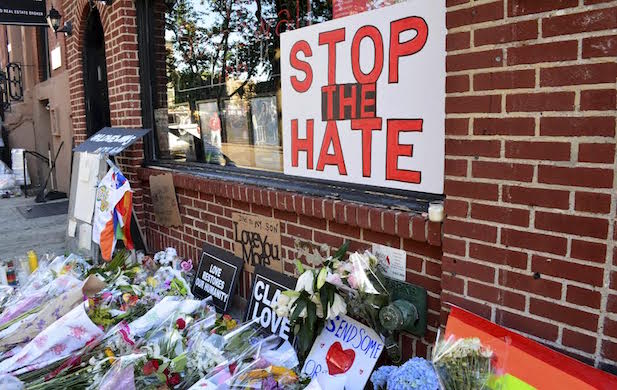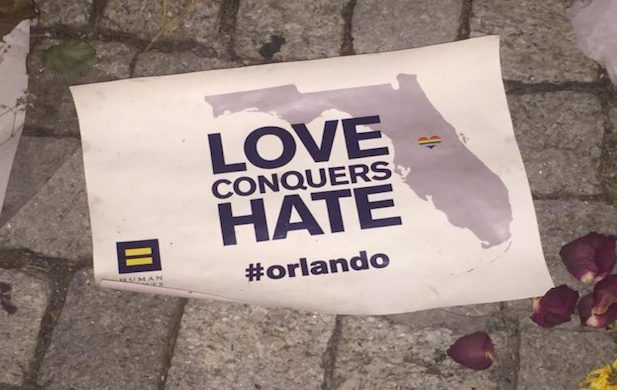How The Tragic Orlando Shooting Brought Overlooked Subjects To Light
Requests: 0
Views: 38
As I lay down in my bed still overwhelmed about the tragedy in Orlando, I cannot fathom the pain that many of the victim’s loved ones are continuing to feel.
I have still not been able to process this tragedy, and I may never be able to process it completely, and I have to be able to make peace with that journey of grief. What happened was unfathomable and unexpected.
 Memorial outside the landmark Stonewall Inn in NYC to honor of the victims of the Orlando mass shooting (Photo: iStockphoto)
The tears coming down my face are tears of pain that the LGBTQ community face on a day-to-day basis. Our fears and tears are not unfounded. We have been continually silenced by society. We have expressed our sentiments and have shouted for recognition of our pain for years. Yet, many of these concerns have been dismissed by people who have the privilege of not experiencing this form of discrimination. This event has affected many different communities, and we cannot forget the importance of examining this mass shooting as intersectional violence.
The shooter actively picked a specialized “Latino” event to commit all of these murders. His racist ideologies that have been confirmed by NBC News fueled the need to target communities of color. His hatred against gay people stems from homophobia, and his “mental health” state categorized as bipolar from the ex-wife demonstrates ableist language that is used to dehumanize people with disabilities by categorizing them as unstable. Racism, homophobia, and ableism are all systemic structures that have been used defile, degrade, dismiss, and murder communities who may fall victim to these institutions.
Memorial outside the landmark Stonewall Inn in NYC to honor of the victims of the Orlando mass shooting (Photo: iStockphoto)
The tears coming down my face are tears of pain that the LGBTQ community face on a day-to-day basis. Our fears and tears are not unfounded. We have been continually silenced by society. We have expressed our sentiments and have shouted for recognition of our pain for years. Yet, many of these concerns have been dismissed by people who have the privilege of not experiencing this form of discrimination. This event has affected many different communities, and we cannot forget the importance of examining this mass shooting as intersectional violence.
The shooter actively picked a specialized “Latino” event to commit all of these murders. His racist ideologies that have been confirmed by NBC News fueled the need to target communities of color. His hatred against gay people stems from homophobia, and his “mental health” state categorized as bipolar from the ex-wife demonstrates ableist language that is used to dehumanize people with disabilities by categorizing them as unstable. Racism, homophobia, and ableism are all systemic structures that have been used defile, degrade, dismiss, and murder communities who may fall victim to these institutions.
 Sign placed in D.C. during vigil (Photo taken by Benjamin McAfee)
I will break free from all of these forms of oppression and live my life according to my own truth as an apologetic intersection.
I can't fully express how saddened I am by the tragic event that happened in Orlando. I have been able to go to the continuous vigils, discussions, and fundraisers for the victims in Orlando here in Washington D.C. This is an experience I recommend for people who need safe spaces to process this event. We must remain strong as a community walking in love, not hate.
Sign placed in D.C. during vigil (Photo taken by Benjamin McAfee)
I will break free from all of these forms of oppression and live my life according to my own truth as an apologetic intersection.
I can't fully express how saddened I am by the tragic event that happened in Orlando. I have been able to go to the continuous vigils, discussions, and fundraisers for the victims in Orlando here in Washington D.C. This is an experience I recommend for people who need safe spaces to process this event. We must remain strong as a community walking in love, not hate.
 Memorial outside the landmark Stonewall Inn in NYC to honor of the victims of the Orlando mass shooting (Photo: iStockphoto)
The tears coming down my face are tears of pain that the LGBTQ community face on a day-to-day basis. Our fears and tears are not unfounded. We have been continually silenced by society. We have expressed our sentiments and have shouted for recognition of our pain for years. Yet, many of these concerns have been dismissed by people who have the privilege of not experiencing this form of discrimination. This event has affected many different communities, and we cannot forget the importance of examining this mass shooting as intersectional violence.
The shooter actively picked a specialized “Latino” event to commit all of these murders. His racist ideologies that have been confirmed by NBC News fueled the need to target communities of color. His hatred against gay people stems from homophobia, and his “mental health” state categorized as bipolar from the ex-wife demonstrates ableist language that is used to dehumanize people with disabilities by categorizing them as unstable. Racism, homophobia, and ableism are all systemic structures that have been used defile, degrade, dismiss, and murder communities who may fall victim to these institutions.
Memorial outside the landmark Stonewall Inn in NYC to honor of the victims of the Orlando mass shooting (Photo: iStockphoto)
The tears coming down my face are tears of pain that the LGBTQ community face on a day-to-day basis. Our fears and tears are not unfounded. We have been continually silenced by society. We have expressed our sentiments and have shouted for recognition of our pain for years. Yet, many of these concerns have been dismissed by people who have the privilege of not experiencing this form of discrimination. This event has affected many different communities, and we cannot forget the importance of examining this mass shooting as intersectional violence.
The shooter actively picked a specialized “Latino” event to commit all of these murders. His racist ideologies that have been confirmed by NBC News fueled the need to target communities of color. His hatred against gay people stems from homophobia, and his “mental health” state categorized as bipolar from the ex-wife demonstrates ableist language that is used to dehumanize people with disabilities by categorizing them as unstable. Racism, homophobia, and ableism are all systemic structures that have been used defile, degrade, dismiss, and murder communities who may fall victim to these institutions.
The tears I shed are intersectional, and I feel hopeless. For a moment, I could not stop crying over my identity as a Black male. As a Black man, I am constantly under attack. Every time I hear about another case of a black male shot by a cop, a cop being acquitted of murder, or a black male who never committed rape and was placed in jail for five years, I am reminded of a system that has been created to bind me and keep my shackles from breaking free. As a gay person, I have not been spared from homophobia. This homophobia has created self-hatred, depression, and identity issues. I had to live in the closet for many years, and feared rejection from friends and loved ones. I have worried about being openly gay, making a relationship public, losing my job, and physically/verbally attacked for not conforming to hyper-masculinity.See how #Latinx & #LGBT leaders are mobilizing in the wake of the #Orlando shooting & how allies can support. https://t.co/WJu7dQxE89
— Voto Latino (@votolatino) June 19, 2016
But an aspect of this case that seems to be swept under the rug is the rhetoric surrounding disabled people. As a person with bipolar disorder, I am offended at the comments that his ex-wife made of him being mentally unstable by utilizing the term bipolar liberally to describe his state of mind. By utilizing this term without the certainty of a verifiable diagnosis, it dehumanizes people with bipolar disorder and incarcerates them into a world surrounded by fear, stigma, and rejection. As someone who was diagnosed eight years ago and has been stable since my diagnosis, I am led to believe that I will experience much emotional violence throughout the course of these conversations and in my lifetime. The constant barrage of mental health scapegoating serves to feed into a structure that is made to not address the issue of gun control, and fails to recognize that people with mental health conditions are more likely to be the victims of violence than the aggressors. These ableist comments keeps people with mental health conditions in institutions, and does not allow or provide a space for us to live in recovery. My tears are the experiences that I have had as an intersectional individual. I will not let these shackles incarcerate me, the closet enclose me, or an institution break me.What advice does #Orlando have for LGBT communities around the world? https://t.co/8ZXj6nF7O8https://t.co/WckabZdMnm
— BBC Pop Up (@BBCpopup) June 20, 2016
 Sign placed in D.C. during vigil (Photo taken by Benjamin McAfee)
I will break free from all of these forms of oppression and live my life according to my own truth as an apologetic intersection.
I can't fully express how saddened I am by the tragic event that happened in Orlando. I have been able to go to the continuous vigils, discussions, and fundraisers for the victims in Orlando here in Washington D.C. This is an experience I recommend for people who need safe spaces to process this event. We must remain strong as a community walking in love, not hate.
Sign placed in D.C. during vigil (Photo taken by Benjamin McAfee)
I will break free from all of these forms of oppression and live my life according to my own truth as an apologetic intersection.
I can't fully express how saddened I am by the tragic event that happened in Orlando. I have been able to go to the continuous vigils, discussions, and fundraisers for the victims in Orlando here in Washington D.C. This is an experience I recommend for people who need safe spaces to process this event. We must remain strong as a community walking in love, not hate.
Reactions